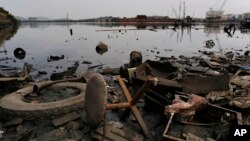A broken computer with wires showing: $60,000. A cracked, yellow plastic chair: $16,000. An old, stained backpack: $8,000. Cleaner water for Olympic sailing and windsurfing events: Priceless.
The soiled items, fished out of the city's picturesque Guanabara Bay, are not actually for sale in the luxury shopping mall in Rio de Janeiro where they are displayed. But the prices reflect the environmental cost of waste thrown into the bay where the sailing and windsurfing competitions are scheduled in the 2016 Summer Olympics.
The exhibition, "Achados da Guanabara" ("Found in Guanabara"), seeks to personalize the pollution and force people to take responsibility for the waste they throw into the water. A boat and divers collected the items from the water.
As part of its Olympic bid, Rio promised to clean up 80 percent of the bay for the games. But local government officials have already admitted that a cleanup by 2016 is not achievable.
Despite millions of dollars of investment over the years, the bay still stinks of sewage. Sailors who visited the city for test events complained of a floating sofa and a dead dog in the water.
For Fernanda Cortez, who works for the environmental movement Menos 1 Lixo (One Piece of Rubbish Fewer) and organized the exhibition, the cleanup of the bay needs greater public awareness as well as government support.
"The state is not some magical organization that can solve these issues alone. ... It's really important that citizens understand they are responsible for polluting the bay and have a role to play in cleaning it up,'' Cortez told Reuters on Tuesday at the exhibition in the Shopping Leblon mall.
"These items that are on display didn't just fall into the bay. Someone threw them there,'' Cortez added.
Marine biologist Marcelo Szpilman calculated the prices for the pieces of rubbish, estimating the cost of environmental damage from each item, depending on how long it takes to decompose.
Cortez said Menos 1 Lixo is in discussions with the International Olympic Committee to work together to raise awareness of the damage caused by disposing of waste in the bay.
"There's nothing fixed yet, but they're open to the idea,'' Cortez said.





